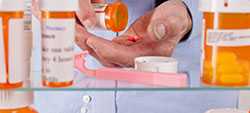Fighting Opioid Overdose
 Working together makes us stronger in our fight against the opioid overdose epidemic. Learn what we can all do to protect Americans from opioid overdose.
Working together makes us stronger in our fight against the opioid overdose epidemic. Learn what we can all do to protect Americans from opioid overdose.
The opioid overdose epidemic is devastating families and communities across America. Whether you’re a professional working in preventing drug abuse or treating addiction, or a healthcare provider, first responder, or law enforcement officer the opioid epidemic is likely affecting you, someone you love, or your community. No matter who you are, our goal is the same—to end the opioid overdose epidemic currently ravaging the United States.
We all have a role to play on the frontlines of this fight against opioid overdoses. Here at CDC, our role is to support physicians with tools for safer prescribing of opioids to help prevent misuse and overdoses. We aim to help healthcare providers offer safer, more effective treatments for pain management based on the best available science. We also collect, analyze, and report out the key data that is needed to make important decisions about overdose prevention, and we develop helpful resources to give patients and medical professionals the best information to effectively manage pain and to treat opioid use disorder.
Do you know about the opioid overdose epidemic?
According to the most recent CDC data, we know that most drug overdose deaths in the United States involve an opioid. Some numbers to know are:
- Opioids were involved in more than 33,000 deaths in 2015.
- Sixty three percent of drug overdose deaths in 2015 involved an opioid.
- Every day, 91 Americans die from an opioid-related overdose.
- The number of overdose deaths involving opioids has quadrupled since 1999.
- Heroin-related overdose deaths increased by 21 percent from 2014 to 2015.
- In 2015, 12,989 people died from a heroin-related overdose.

Learn more about who is at most risk for opioid use disorder in your community.
What is your role in preventing opioid-related overdoses?
Any one of us can be called to fight on the frontlines of this public health crisis. Do you know what you can do to help?
- Learn more about opioids so you can help people who are most at risk for opioid use disorder and overdose in your community.
- Provide tools and information for healthcare professionals working on overdose prevention and treatment.
- Help those struggling with opioid use disorder find the right care and treatment.
- Increase awareness and share best practices with providers and patients in your community.
As a patient, a healthcare provider, or a member of a community you can ensure that the best information is being shared and understood to prevent overdose deaths.

Physicians can access CDC tools to help prevent opioid abuse and overdose.
How can CDC help?
CDC works to ensure the right resources are available through accurate data, trainings, tools, and coordination with others working to prevent opioid overdose. At the annual National Rx Drug Abuse and Heroin Summit, CDC meets with diverse groups working on prescription drug and heroin overdose prevention, and we share resources on how we can best work together to protect the health and safety of Americans. CDC will feature the CDC Guideline for Prescribing Opioids for Chronic Pain and how to apply the guideline with real-world prevention strategies for the 2017 conference.
More Information
Do your part to stop the opioid epidemic in the United States and learn what resources and information are available:
- CDC Opioid Overdose website
- CDC Heroin
- CDC Fentanyl
- CDC Guideline for Prescribing Opioids for Chronic Pain
- CDC Guideline Resources and Tools
- CDC Guideline Resources: Trainings
- CDC Guideline Resources: Mobile App
If you know someone with a substance abuse issue, refer them to SAMHSA’s National Helpline at 1-800-662-HELP (4357) or SAMHSA’s Behavioral Health Treatment Services Locator.
- Page last reviewed: April 17, 2017
- Page last updated: April 17, 2017
- Content source:
- National Center for Injury Prevention and Control, Division of Unintentional Injury
- Page maintained by: Office of the Associate Director for Communication, Digital Media Branch, Division of Public Affairs




 ShareCompartir
ShareCompartir